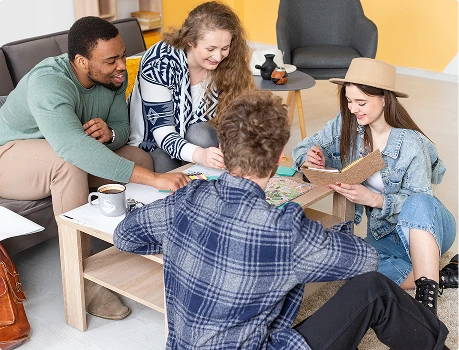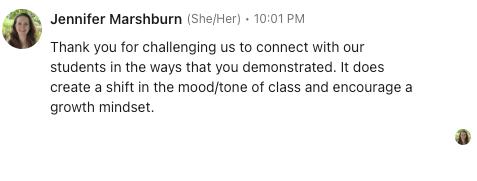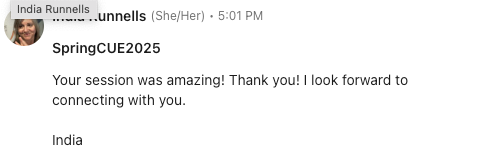Our interactive Keynote presentations will Inspire and Energize your people while providing them research based practical tool that provide results
We support Leaders, Teachers, and Parents to thrive at work and at life using skills that they can model to their co-workers, their students and their children.
Fun, useful, and transformative keynotes that lead to professional and personal development are our trademark.
Our keynotes are rooted in the fields of Emotional Intelligence, Positive Psychology, Mindfulness, Leadership Development and Neuroscience.
- Our Keynote and Workshops can be provided in person or virtually

Single or Multiple Day Workshops/Retreats for Educators
These workshops are designed to provide your staff with a deep dive into how to integrate Positive Psychology, Mindfulness, and Emotional Intelligence strategies in their work with students and / or their colleagues, as well as how to use these skills to increase their wellbeing in their daily life.

Single or Multiple Day Workshops/Retreats for Leadership Teams
These onsite or offsite retreats are designed to uplevel the emotional resonance, coherence, trust, and creativity of your team. Your people will learn leadership and emotional intelligence skills experientially with one another and will reflect and plan the integration of these skills into their daily work.
Inspire, Connect, and Transform


TRAINING TOPICS FOR LEADERS
Joyful Leadership: Applying Positive Psychology, Emotional Intelligence, and Mindfulness to your life and your work
Connections matter more than anything. Effective leaders understand that. In this workshop you will discover ways to increase your emotional intelligence and your school staff EQ (or district team), and to bring more joy, connections, and meaning to your work and life. You’ll learn how to infuse your team with emotional resonance and enhance your ability to courageously and effectively lead your school or district. You’ll get strategies that deepen trust and help navigate vulnerable conversations within your team and get actionable tools towards creating cultures in schools that value the wellbeing of students and staff above all while deepening the learning and academic abilities of kids. Topics such as Self-Regulation, Self-Management, Empathy, Stress-Reduction, Effective Communication, and the role of Play and Joy will be covered. These concepts are research based, grounded in the science of the fields of Positive Psychology, Emotional Intelligence, and Mindfulness. This will be a highly interactive, energetic, and experiential workshop so get ready to have some fun!
Inspiring Possibilities in Us and Others
Leaders who are connected to the fire underneath their own vision and allow themselves to dream big are resonant leaders that people want to follow. And to lead with that resonance, these leaders must first believe that they have the ability to effect change they so desire. Too many leaders allow their inner critic (or their limiting beliefs) to drive their decision and distort their reality. Left unchecked, these limiting beliefs keep us from our potential. Yet, when we realize that our empowering beliefs are more realistic, we can lead from a place of peace and power. When we are tuned in the excitement of our vision and believe in our ability to affect change, it’s easier for us to fully believe in our teammates’ ability and empower them to lead. In this Keynote we’re going to give ourselves space to acknowledge ourselves for everything we’ve accomplished so far and tune in to what our heart desires, reconnecting with our fire for what we do and for how we want to grow. We’re also going to bust through our disempowering beliefs with proven strategies and take one first step of action towards bringing the change we wish to see in the world. This Keynote is research based and will be interactive, inspirational, and fun. So, get ready to be active, have some fun, and even experience some breakthroughs.
You can’t spell Equity without EQ. Applying Emotional Intelligence and Mindful Connections to allow Equity to Flourish
In order to deepen our cultural competency and optimize equity in our schools and districts, we need to be aware of our own biases (conscious and unconscious), we need to be emotionally aware of the emotions that come up when we explore our biases (fear, guilt, shame, sadness), and we need to know how to down regulate our nervous systems when these emotions come up so that instead of adopting mal-adaptive behaviors such as defensiveness or apathy, we can be regulated enough to take an honest look at what we can own and what active steps we can take towards becoming more culturally competent. Once emotional awareness and regulation is established, it is much easier for us to be socially aware of our students and colleagues’ experiences, to be attentive and attuned to their verbal and non-verbal cues, and to be empathic. Simply put, the root of cultural competency and equity lies in the 4 competencies emotional intelligence: Emotional Awareness, Emotional Regulation, Social Awareness, and Relationship Management. Mindfulness is the foundation of these four competencies. In this highly interactive and experiential workshop, you’ll gain strategies to use in your own life as well as activities to use with your staff to promote equity with joy.
The ABCs of having difficult conversations while keeping the relationship intact
Most leaders avoid difficult conversations for two main reasons. They don’t have the tools to hold them and / or they don’t build up the courage to have them at the right time that they need to occur. In this session, you will learn seven proven communication strategies that allow you to navigate difficult conversations with more ease and you will learn the inner game tools necessary to develop the mindset to follow through with it. These skills are a must for leaders who lead with integrity and who want to do so with more ease.
Detach from what keeps you up at night and get some rest!
Have you ever felt overwhelmed at work? For most of us, the answer is absolutely! Too many leaders don’t have the tools to detach from what keeps them up at night and are not able to get the recovery they need to be at their best. If you want to be the best you can be as a leader for a long long time, it’s time to take mindfulness and self-care seriously. You’ll learn how to become more aware of your triggers on a somatic level and learn how to experience more peace and more joy in your personal life and at work.
Communicate like a wizard!
Most of the mistakes leaders make have to do with poor communication. Whether it’s not listening mindfully, not being aware of their non-verbal communication, or simply being uncomfortable (or fearing) public speaking. In this session you’ll learn useful strategies that allow you to gain trust and buy-in from your staff while avoiding common pitfalls that can easily lead to damaging relationships. You’ll also learn simple yet powerful tools to use when you speak to an audience. Most leaders only think about what they want their audience to know. A few leaders remember to think about what they want their audience to do. Yet almost no leader thinks about what they want their audience to feel. In this workshop, you will not only have a chance to delve into what you want your audience to feel and experience, you will also reconnect to why that’s important to you so that you can inspire those who follow you. This workshop will be active, super fun, and you’ll learn a ton!
Practicing Radical Self Care
Beliefs are the number one predictor of success. Left unexamined, our mind often loves to feed us disempowering thoughts that are almost always wrong. That’s because our mind is not designed to make us happy, it’s designed to make us survive. In this session you will learn to train your mind to be able to choose empowering thoughts and you will discover that these thoughts are almost always more realistic than unexamined thoughts. With the right beliefs in place, you’ll gain clarity, and start to make incremental decisions that allow you to manifest your leadership and life vision.
The power of choosing the right beliefs
Burnout occurs when there is too much stress with no recovery. In this session it will become crystal clear to you that your recovery time is a part of your work and you should protect it with as much vigor as you protect your students. We will learn about the link between recovery and high performance as well as higher levels of wellbeing. We’ll look at the powerful myths that prevent us from committing to our self-care, and we’ll learn how to use activation energy and commitments in our favor. We’ll also delve into what deeper emotional self-care looks like when we face adversity. If you want to remain a leader for a long time while living a rich life, this session is a must.
Get your gremlins out of the way, so you can be fully there for your staff and students!
Have you ever wanted to implement a new program or idea at your school that you knew would be amazing for students but decided not to do it because a voice in your head told you that you are unrealistic, or that it would be impossible? All of us have a squad of gremlins (the inner critic voices in our heads) that are masterful at bringing us down and keeping us from our potential. It’s time to “dance with the gremlins” so we can be our best selves for our staff and students. In this session, we will learn how to tame our gremlins through understanding what cognitive distortions are, using self-compassion, and establishing self-empowering beliefs.
Positive Psychology at work
In this session you will learn how to use research from Positive Psychology to take your school to the next level. We will explore concepts such as Flow, the Positivity Ratio, the Broaden and Build theory of Positive Emotions, Activation Energy, and more. Instead of just learning about these concepts intellectually, we will engage in activities that will lead us to experience their benefits as well.
Relationships Above All
Connections matter more than anything. Effective teachers understand that. And in this interactive session, you will discover ways to increase your social and emotional intelligence as well as that of your students. You will gain tools to bring more joy, connections, and meaning to your work and life, and learn how to enhance your ability to effectively take your teaching to the next level. You will experience actionable practices that can create a culture in your classroom that value the wellbeing of students above all while deepening their learning and academic abilities. Topics such as Social Attunement, Self-Regulation, Self-Management, Empathy, Stress-Reduction, Effective Communication, and the role of Play and Joy will be covered. These concepts are research based, grounded in the science of the fields of Positive Psychology, Emotional Intelligence, and Mindfulness. This will be a highly interactive, energetic, and experiential workshop so get ready to have some fun!
The Power of Play and Connection!
People that play together, learn and work better together. It’s time to take play, connections, and joy in our school seriously. In this session, you’re not only going to learn about the Positive Psychology research behind why these are so critical to actualizing the potential of your staff and students, but you will feel it yourself! Warning – this session will be active, super fun, and you’ll learn a ton! Let’s do it!
Teaching to the Human Core
Happy students are more creative, collaborative, and productive. They are also more resilient and have richer lives. The number one predictor of well-being is having supportive relationships in our lives. In this interactive keynote you will get practical activities that integrate Positive Psychology, Mindfulness, and Emotional Intelligence strategies into your pedagogy. We’ll see how these lead to supportive and caring relationships in the classroom and how to prime our students’ brains to be more ready to learn. We’ll also delve into the importance of our own wellbeing and learn self-regulation and mindset tools to help us face the daily challenges of being an educator. We will play, laugh, and learn a ton together and you’ll be introduced to concepts from interpersonal neurobiology to simple improv games all in the name of creating healthy relationships in your classroom.
Mindfulness in our lives and in our classroom
Want to be the best you can be in the classroom for a long long time? It’s time to take self-care and mindfulness seriously. Mindfulness is the ability to pay attention in the present moment, non-judgmentally and is an essential component for raising emotional intelligence. Mindfulness exercises allow people to clear and calm their minds, sharpen their focus, and lead to a state of clarity and peace. In this workshop you will experience the benefits of mindfulness exercises and learn how to implement these with your students in your classroom.
Stopping Perfectionism and Fostering Growth Mindset
Perfectionism is the debilitating fear of failure. Although rarely discussed, perfectionism kills creativity, ingenuity, and happiness and it is rampant in schools around the world. In this workshop you will experience techniques that help free your students (and yourself) from perfectionism and liberate your students (and yourself) to take creative risks.
Practicing Radical Self Care
Burnout occurs when there is too much stress with no recovery. In this session it will become crystal clear to you that your recovery time is a part of your work and you should protect it with as much vigor as you protect your students. We will learn about the link between recovery and high performance as well as higher levels of wellbeing. We’ll look at the powerful myths that prevent us from committing to our self-care, and we’ll learn how to use activation energy and commitments in our favor. We’ll also delve into what deeper emotional self-care looks like when we face adversity. If you want to remain an educator for a long time while living a rich life, this session is a must.
The power of choosing the right beliefs about your students (and about yourself)
Beliefs are the number one predictor of success. Left unexamined, our mind often loves to feed us disempowering thoughts that are almost always wrong. That’s because our mind is not designed to make us happy, it’s designed to make us survive. In this session you will learn to train your mind to be able to choose empowering thoughts about yourself and about your students, and you will discover that these thoughts are almost always more realistic than unexamined thoughts. With the right beliefs in place, you’ll gain clarity, and start to make incremental decisions that allow you to fulfil your vision for yourself and your students.
The link between mindfulness and reduction of mental illness symptoms
When students exhibit mental illness symptoms, such as, anxiety, excessive fear, withdrawal, and excessive anger, among others, the limbic system of their brains, which contains the amygdala is overactive. That leads them to experience a fight, flight, or freeze response and they are unable to learn. In order to reduce our students’ mental illness symptoms, we need to provide them with evidence-based tools that help down regulate their nervous system. In this workshop, educators will be taught mindfulness practices that allow students to regulate their nervous systems by focusing on their breath, and the sensations in their bodies and by paying attention, in the present moment, non-judgmentally. These practices can also allow students to stimulate their vagus which helps regulate the nervous system. When their nervous systems are regulated, students can then become observers of their own experience. Instead of being caught up in fear, they can recognize that they are feeling fear and use the multiple mindfulness strategies to move through the sensations and emotions that accompany this symptom. They also gain a recognition that all emotions and symptoms are temporary and are therefore able to get back to feeling more peaceful and more ready to learn.
The Emotionally Intelligent Teacher
Emotional Intelligence is the ability to monitor one’s own and other people’s emotions, to label these emotions appropriately, and to use emotional information to guide thinking and ultimately behavior. Discover how Emotional Intelligence skills enhance your pedagogy and learn proven ways to use these skills and transfer them to your students. Topics such as Self-Regulation, Self-Management, Empathy, Stress-Reduction, Effective Communication, Motivation and Passion, will be covered
Fostering Creative Confidence and Design Thinking – workshop
Ready to experience the elements of Design Thinking so that you can infuse your classroom and school with your creative confidence? Then this is a must attend session for you. We’ll engage in exercises that take place in the popular Design School (D. School) at Stanford so you can get a clear understanding and a quick taste for this powerful methodology that has changed how major organizations operate to how project-based learning is shaped. There will be a serious bias towards action in this presentation so be ready to NOT sit still.
Get your gremlins out of the way, so you can be fully there for your students! – Workshop
People are most successful when their wellbeing is optimized. But all of us have a squad of gremlins (the inner critic voices in our heads) that are masterful at bringing us down and keeping us from our potential. It’s time to “dance with the gremlins” so we can be our best selves for our students. In this session, we will learn how to tame our gremlins through understanding what cognitive distortions are and using self-compassion and vulnerability.
What’s better than students giving amazing answers? Students asking amazing questions!
Learning happens when people ask questions. Come learn a technique that will train your students to ask better questions that engage their intrinsic curiosity. You’ll take the role of a student in this session and see why the QFT process is so beautifully addictive to students and teachers!

TRAINING TOPICS FOR EDUCATORS

TRAINING TOPICS FOR PARENTS
Mindful Parenting
We all want our children to be happy, more peaceful, more attuned to others’ needs, and to be able to regulate during stressful times. The best way for them to learn these skills is through watching their role models practice them. Yet, what does it mean to be mindful? And what does it mean to parent mindfully? How can we become more present with and for our children when life can be so incredibly busy? How can we begin to emotion coach our children and help them thrive through adversity? In our time together, we’ll explore these questions and understand the why and how of mindful parenting. This session will be active, fun, and you’ll learn a ton!
Mindful Parenting 2.0
Parenting is no easy task. Power struggles, peer or sibling conflicts, and a lack of cooperation are only a few of the many challenging situations parents must deal with on a daily basis. In this session we will delve into what it means to be fully emotionally attuned to your child and explore what causes us to get triggered as parents and how to regulate ourselves so we can fully regulate and support our children. We will also learn tangible listening skills applicable to any relationship in life and essential to parenting. You’ll also learn about research-based skills to cultivate more resilience and cooperation in your children, and help you manage the stresses of parenting and life more effectively. This session is going to be interactive, practical, and packed with great strategies. Get ready to have fun! Attendance in the first mindful parenting workshop is not required in order to get a lot of value from this session.
Mindful Parenting 3.0
In our final session together you’ll learn about research based skills to cultivate more resilience and to get more cooperation from your children. You’ll get new strategies to help you manage the stresses of parenting and life more effectively. This session is going to be interactive, practical, and packed with great strategies. This session will be active, super fun, experiential, and you’ll learn a ton! Attendance in the first two mindful parenting workshops is not required in order to get a lot of value from this session.
Here is what leaders and educators say about their experience…
Words cannot properly express my deepest appreciation for sharing Roni’s wisdom and passion with us today. I could not have written a script for it any better and far exceeded my expectations. The response has been widespread with even some of our most resistant teachers taking part in gathering students Emotional Intelligence through play within their lessons.
Davis Stewart
Principal, Rocklin High School
I’ve been teaching 20 years and I felt so excited to return to my 5th graders and start implementing some of the mindfulness skills I learned from you.
Lisa Brigulio
Teacher
Roni’s support has been integral in building districtwide capacity for student wellness. He is an engaging presenter with a deep understanding of impactful strategies. We are grateful for his influence on our district culture and community.
Terry Walker
Superintendent, Irvine Unified School District
Roni Habib provided professional development to all district staff which included classified employees, teachers, site and district leaders and was our keynote speaker to kick off the beginning of the school year. Staff loved him! Not only did he engage and motivate staff, he connected with us on our level. He delivered a great keynote address with a very powerful message. He was well received by everyone and spent extra time really listening to the needs of our district
Yolanda
Assistant Superintendent, Gonzales Unified School District
Roni’s work provided our educators with an ‘I got this’ mindset. His knowledge and energy brought immediate relief to those feeling overwhelmed, reinforcing leadership and creating a renewed sense of purpose.
Dana Tevenian
Superintendent, Turlock Unified School District







